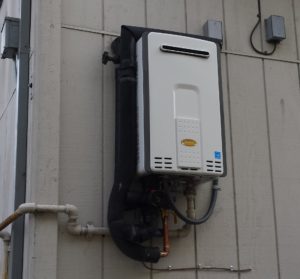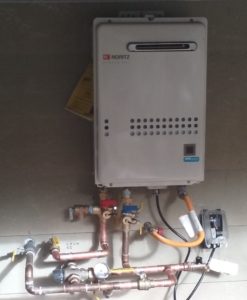Tank or Tankless?
We have a lot of people who call asking what water heater is best for their needs: tank or tankless. We would like to discuss the pros and cons of each, then you can decide based on which one would work best for your needs and budget.
Tankless water heaters operate without a storage tank by heating water on demand. They start to work only when the hot water is turned on. Tank or Standard water heaters operate by storing hot water in a tank ready to use when needed. The differences between the two can be summed up in 4 categories:
Efficiency
Tankless: For homes that typically use less than 41 gallons a day, tankless water heaters may be  more energy efficient. Tankless water heaters operate on a on-demand basis. Water is flash heated when it is turned on. Will you get instantaneous hot water? Depends on the proximity of the heater to the faucet. As with tank water heaters the closer the faucet is to the tank the quicker the hot water. Energy Star tankless water heaters can typically save a family $100 per year on electric bills. Gas powered tankless water heaters are less efficient if they require the pilot light to stay on when heater is not in use. There are now Intermittent Ignition Devices (IID) installed on some tankless water heaters, so the pilot light only comes when hot water is needed. These devices are the same as the devices used on some gas stoves.
more energy efficient. Tankless water heaters operate on a on-demand basis. Water is flash heated when it is turned on. Will you get instantaneous hot water? Depends on the proximity of the heater to the faucet. As with tank water heaters the closer the faucet is to the tank the quicker the hot water. Energy Star tankless water heaters can typically save a family $100 per year on electric bills. Gas powered tankless water heaters are less efficient if they require the pilot light to stay on when heater is not in use. There are now Intermittent Ignition Devices (IID) installed on some tankless water heaters, so the pilot light only comes when hot water is needed. These devices are the same as the devices used on some gas stoves.
Tank: Tank, which is where the hot water is stored are always on to maintain the temperature of the water. This means the hot water tank is always running, which can use a lot of electricity or gas. Because hot water sits in the tank even when it is not in use, there is standby heat loss. Some of this loss can be prevented if you use a heavily insulated tank.
Convenience
Tankless: While tankless provides hot water almost instantaneously, because of the lower flow rate it is very difficult if not impossible to do two tasks at the same time. If you are washing dishes you cannot take a shower. After completing one job it may be a while before you can start another. You will just get a trickle of water or none at all. This can be solved by having a tankless water heater at each faucet, which could be costly. Gas fueled heaters can have a higher flow rate than electric ones, they still may not be able to handle the demand of two or more tasks done simultaneously.
Tankless hot water heaters take up less room if space is a factor, but are more difficult to install.
Tank: As long as there is water in the tank you will have hot water for the most part. Although many of us have been in that situation when someone flushes a toilet you are standing in scalding water in the shower. The larger the hot water heater the more hot water you will have available.
Reliability
Tankless: These water heaters will last 15-20 years on average.
Tank: These water heaters tend to have a 10-12 year lifespan with a 7 year warranty. They need to be maintained as there can be sentiment build up which will need to be flushed out.
Expense
Tankless: Tankless water heaters are more expensive to purchase and install than tank water heaters. Also, if you are switching from a tank to tankless retrofitting may need to be done to accommodate the heater. While there is a higher cost outlay initially, they are less expensive to maintain.
Tank: Tank heaters are much less expensive to purchase and install, but may need to be replaced more often. As was stated above these are also more expensive to run overall.
When deciding on which kind of water heater you should purchase you need to take into account budget and needs Call Sun Fire Plumbing to discuss prices and installation costs. We are always happy to help you decide which water heater will work best for you.
